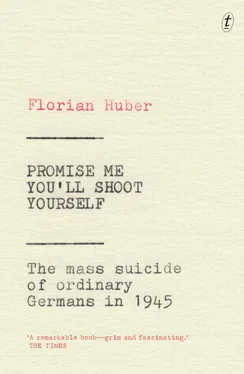Old Frau Rentner, who lived on our corridor and stayed in the same flat until the day she died, later told me that Herr Moldenhauer had come out of the cellar and said: ‘I’ve just shot my wife and children. Now I’m going to do in a few Russians!’
From the window of his flat, Moldenhauer fired a few shots at the advance guard of Soviet soldiers who were moving in along Treptower Strasse. It was a short, violent skirmish. Before the soldiers could storm the house, Moldenhauer had shot himself in the head.
When Wilhelm Damann came to write his report on Demmin a decade after these events, he tried to make sense of this desperate act. But he cited neither Moldenhauer’s hatred and fear of the Russians, nor his desire to defend Demmin at whatever cost. As Damann saw it, the root cause lay in Moldenhauer’s past life and the betrayal of his principles—a betrayal which caught up with him in the moment of defeat. ‘I see his act as that of a gambler who’d staked everything on one card and knew he’d lost. Presumably shame played a part too.’
• • •
Soon afterwards, there was another gunfight in the town centre. Some Hitler Youth boys apparently decided to do their bit for final victory by firing shots from the gatehouse windows in the thick walls of Luise Gate, and the Soviets responded by blasting anti-tank grenades into the facade of the ancient gatehouse—at the foot of which, beneath the ground, the Strohscheins were sheltering in their cellar. Ursula Strohschein later described what it was like:
Gunshots cracked, shells roared against the east side of Luise Gate. We sat there, just on the other side of it, afraid it might collapse at any moment. But we didn’t have to wait long. The shooting was soon over. All was quiet. Very cautiously, we ventured out of the cellar.
Out on the street, Ursula risked a glance through the gate and immediately shrank back. A young officer in an earth-brown uniform jumped off a cart and came hurtling towards her—but ran off again, after giving her a quick pat on the shoulder. She had seen her first Russian. It was the encounter they had all been dreading for months.
• • •
On 23 October 1944, the Germans had been confronted with a reality for which Nazi propaganda, with its terrifying slogans about ‘Bolshevik Mongol hordes’, had long prepared them. On this day, Wehrmacht soldiers reclaimed the East Prussian village of Nemmersdorf from the Red Army and found traces of a massacre. Soviet soldiers, setting foot on enemy soil for the first time after three and a half years of war, had killed a number of German civilians. The Wehrmacht soldiers’ first reports spoke of about twenty deaths—women, children and elderly people. Other facts were harder to ascertain, not least because the propaganda machine in Berlin immediately sent in photographers and cameramen to mount a sensationalist campaign.
In the days and weeks that followed, party newspapers reported repeatedly on ‘the horrors of Nemmersdorf’. Shocking photo spreads showed close-ups of murdered Germans, their heads punctured with shot wounds, their skulls crushed, their faces battered beyond recognition. They showed long rows of dead children and of women who had clearly been raped, their skirts pushed up and their underwear ripped away. Cinemas ran newsreels showing looted refugee carts, twisted children’s bodies in muddy pits, horrified onlookers gawping at rows of corpses, and the ubiquitous shot of the village sign, so that it wasn’t long before almost everyone had heard of Nemmersdorf. The aim was to show the Germans what to expect in the case of a Soviet invasion, and there is no doubt that the images left their mark. But rather than fuel a loathing of the ‘Soviet beasts’ and a fierce spirit of resistance, they terrified the civilian population. Although the Nazi leadership held out against evacuation to the end, there was soon a steady flow of people leaving East Prussia. Three months later, this flow had swelled to a mass exodus, with handcarts and horse-drawn wagons.
In January 1945, the Red Army launched its winter offensive against East Prussia as it pushed on towards Berlin. Those who didn’t escape in time felt the full force of retribution for the crimes committed during the German war of extermination. Many refugees were trapped between the Allied and Soviet fronts or caught up with by Russian panzer spearheads. Hardened by the war, whipped up by Russian propaganda and stripped of their inhibitions by alcohol, the Red Army soldiers went on a massive crime spree. German women and girls, in particular, from the very young to the very old, were exposed to horrific violence. It is estimated that up to two million women were raped by Red Army soldiers in the final stages of the war. The frenzy of the troops was such that even their own leaders considered them a risk to military operations. The commander of the 2nd Belorussian Front called for severe punishment for looting, violence and wanton destruction, but to no real effect. As the Red Army advanced, the atrocities begun in East Prussia continued in West Prussia, Silesia and Pomerania: everywhere houses were burnt down, women raped, civilians murdered. As the columns of refugees moved westwards, fears spread that the hysterical Nazi propaganda might have been spot on for once. By the time the first real-life Red Army soldiers reached Western Pomerania, everyone had heard the stories.
• • •
Roaring diesel engines, the rattle of tank treads on cobblestones, the tramp of boots marching in double time. After two brief exchanges of fire in the early afternoon of 30 April, the fight for Demmin was over and the town occupied by Soviet troops. There was no doubt who had won control. Now the two armoured brigades that had captured Demmin were to continue their rapid pursuit of the German forces heading for Rostock, on the north coast. But when they reached the destroyed bridges at Meyenkrebs and by the harbour, they could advance no further. The quietly flowing Peene, forty metres across and five metres deep, was the most effective obstacle that the Red Army troops encountered that day. Desperate though they were to bring the campaign to an end at last, the soldiers had no choice but to park their tanks and other vehicles at the riverside. There were dozens of them; the line of armoured behemoths extended far into the old town, a herd of steel beasts, raring to go, but forced to inaction. More and more moved in from the east. A Soviet battle log records the time of Demmin’s capture as 4.30 pm. The log was kept in Moscow time. In Berlin, it was an hour earlier—3.30 pm.
• • •
It was at half past three in the afternoon that Adolf Hitler committed suicide in his bunker in Berlin. After lunch, he had withdrawn to his study, followed by Eva Braun—or Eva Hitler, as she was now. No one in the bunker seems to have heard the shot to his temple. The two of them were found sitting side by side on a little sofa. His valet described the scene:
His head was tilted slightly towards the wall; there was blood spattered on the rug next to the sofa. To his right sat his wife, her legs drawn up onto the sofa. A grimace betrayed the cause of her death: cyanide poisoning. Its ‘bite’ showed clearly on her face.
This prosaic and unglamorous death was followed by a brisk cremation. Hitler’s corpse was carried out into the Reich Chancellery garden wrapped in a military blanket. The two bodies were laid side by side on a patch of sand next to the entrance to the bunker, doused with petrol and set alight. A tower sentry looking on pointed this scene out to the watch master. ‘Look, that’s Adolf Hitler there—he’s on fire.’ As the flames shot up in a ball of fire, a barrage of Soviet artillery grenades rained down. The small funeral gathering hastily returned to the bunker. None of Hitler’s retinue cared to witness the burning of the Führer’s body for any longer than was necessary. None of them looked back to make sure that his final instructions had been thoroughly carried out.
Читать дальше












